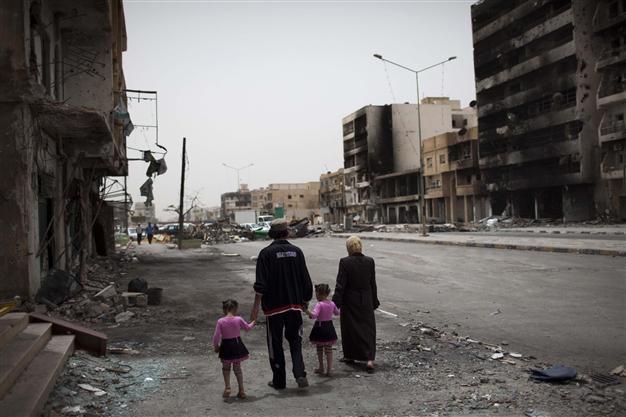NATO must probe, pay for errors in Libya: Amnesty
TRIPOLI - Agence France-Presse

In this Sunday, May 22, 2011 file photo, a family walks during a visit to Tripoli Street, the center of fighting between forces loyal to Libyan leader Moammar Gadhafi and rebels in downtown Misrata, Libya. AP Photo
NATO must investigate the killing of dozens of civilians during its air campaign in Libya last year and provide reparations to the people affected, Amnesty International said on today."Adequate investigations must be carried out and full reparation provided to victims and their families," said the rights group in a statement released one year after the first strike sorties were carried out by the alliance in Libya.
The organisation said it has documented 55 cases of named civilians, including 16 children and 14 women, killed in air strikes in the capital Tripoli, Zliten, Majer, Sirte and Brega.
NATO attacks, which played a key role in helping rebels to bring down dictator Moamer Kadhafi, left a deep rift in the UN Security Council.
Russia, China, South Africa and India all say NATO's tactics breached UN resolutions. The United States, Britain, France and Germany insist their actions were legal and life-saving.
Amnesty International acknowledged that "significant efforts" were made by NATO to avoid civilian casualties, but faulted its failure to investigate strikes that killed innocent people.
"Victims and relatives of those killed by NATO air strikes remain in the dark about what happened and who was responsible," said Donatella Rovera, senior crisis response adviser at Amnesty.
The rights group urged NATO to carry out investigations to determine whether civilian casualties stemmed from a breach of international law, and if so to bring those responsible to justice.
"Many of the deaths occurred as a result of air strikes on private homes," where there was no evidence to indicate that the homes had been used for military purposes at the time of the attack, it said.
Neither NATO nor the Libyan authorities have reached out to the victims, the rights group said in a briefing paper based on interviews it conducted in January and February.
















